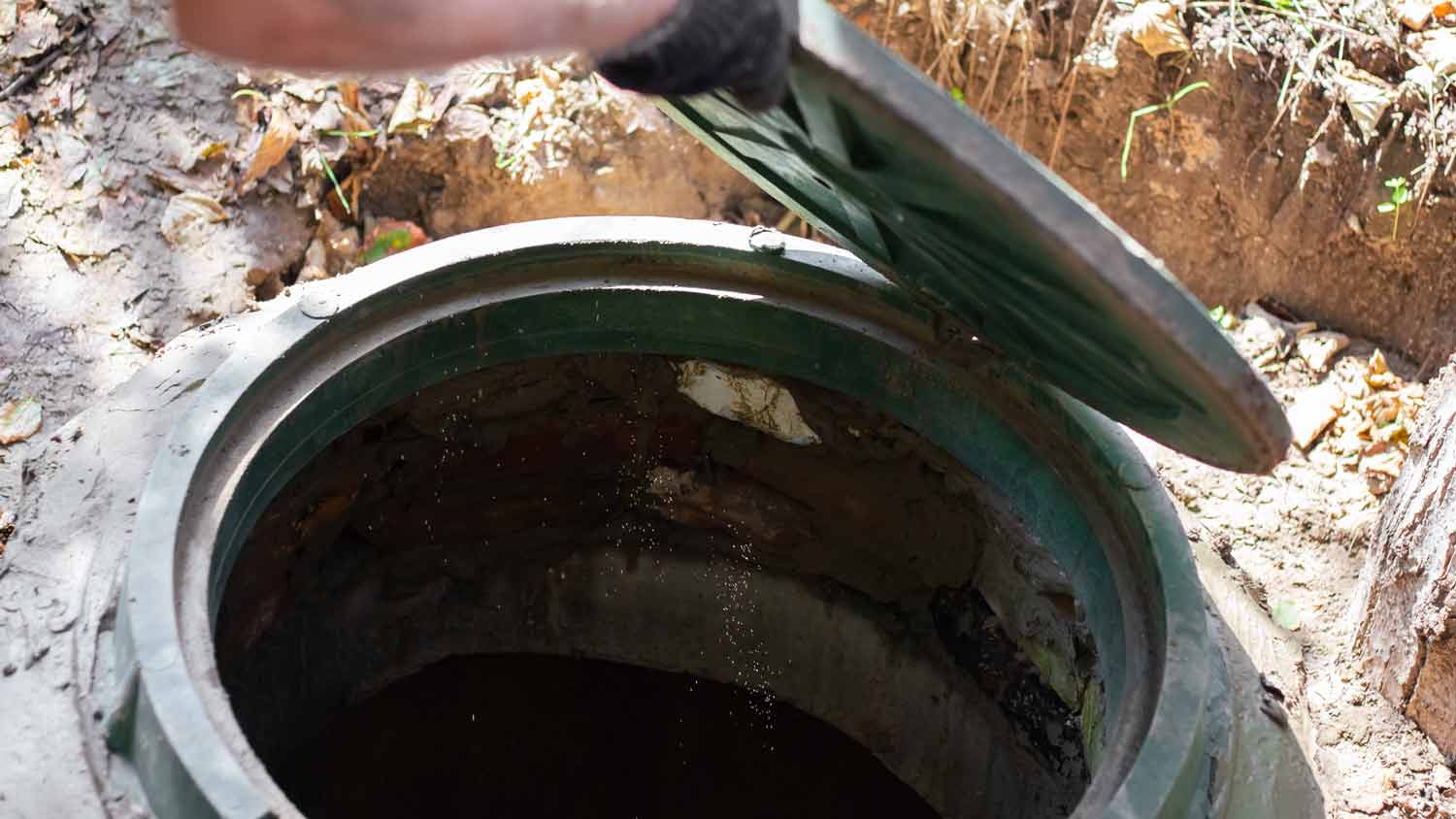
The average cost to connect to a public sewer line in Columbus, OH, depends on the linear footage, piping material, local regulations, and more.
Maximize the lifespan of your system


Most septic tanks last 15 to 50 years, depending on material, usage, and environment.
Schedule annual inspections ($200 to $900) to catch issues before they become costly.
Call a pro if you notice slow drains, bad smells, or other plumbing changes.
Septic repairs cost $630 to $3,040, but full replacements range from $2,910 to $18,600.
Check your septic system warranty before scheduling major work.
Whether you’re installing a new system or wondering whether it’s time to replace your current one, you’re likely wondering: How long do septic tanks last? The average lifespan of a septic tank is between 15 and 50 years. Type, usage, size, and even the soil type in which it rests all play a role in a septic tank’s longevity. However, knowing how the system works and following proper maintenance techniques can help you maximize its potential.
The primary factor that determines how long a septic tank can last is the material it's made of. In some cases, where the tank is concrete, properly installed, and expertly maintained, homeowners can get well over the average lifespan out of their systems. However, most systems last between 15 and 50 years, max. Concrete, steel, and plastic or poly are the most common materials for the various types of septic systems available.
| Septic Tank Material | Average Lifespan (Years) |
|---|---|
| Concrete | 40–50 |
| Plastic | 30–40 |
| Steel | 15–20 |
Several other factors also influence how long your septic tank and system can last. Here are the big five.
Provided proper installation and maintenance are a given, concrete septic tanks outlive the other common septic tank materials, including steel and plastic. Concrete is more durable than the others, and because of its immense weight, it's less prone to damage by ground movement or soil weight.
Concrete is also the most expensive option for installing your system due to the need for extra labor and heavy lifting equipment during the process. However, a concrete septic tank can last between 40 and 50 years. A plastic option can last up to 40 years and a steel version up to around 20 years.
Regardless of the type and material of the tank you install, proper installation is a must to maximize its lifespan potential. Hiring a local septic tank company with area-specific knowledge and skills is essential to getting the most out of your system.
The type of soil your septic tank rests in can affect its lifespan. While concrete septic tanks outperform other tank materials where the groundwater table is high, plastic ones perform better and won't corrode in highly acidic soil.
It's no surprise that the more usage your septic tank sees, the more strain the system must endure, which can reduce its lifespan. Installing the proper size system for your home's needs is crucial for maximizing its number of usable years.
Maintaining your septic system to the best of your ability is the best way to ensure its longevity. A septic system inspection costs between $200 and $900 and is well worth spending every three to five years. Your inspector can check if the septic tank is full and advise how often to pump your septic for the best results and a long lifespan.
Pumping your septic tank every three to five years is one of the most important septic maintenance tasks. When you combine that with flushing only approved items (toilet paper and waste) and avoiding driving over your drain field, you have a recipe for a long-lasting septic system.

While only your septic system professional can tell for sure if it's time to replace your septic tank, there are a few signs that the time is approaching.
Your plumbing is experiencing backups or draining slowly.
Standing water or odors are lingering around your drain field.
The vegetation in and around your drain field has a sudden growth spurt.
Bubbling or gurgling sounds are coming from your plumbing systems.
Your system is older than its expected average lifespan.
The more you can avoid putting non-septic-friendly materials and substances into your system and practice efficient water usage, the longer your system will last. Additionally, the better your maintenance plan, including regular inspections, pump-outs, and repairs as necessary, the longer it will be before you need to replace the system.
Product warranties for septic tanks come primarily from the manufacturer and cover material defects and general system operation. Many installers also warranty the installation, making shopping around essential.
In some cases, such as buying or selling a property, purchasing a home warranty from a local provider can be worth it to cover some repair expenses. However, it's essential to read and understand the fine print in your contract before signing up for a plan. Home warranty plans have strict guidelines for what is and isn't covered.
Deciding whether to repair or replace your septic tank requires professional insight and a thorough inspection. The cost of septic tank repair averages between $630 and $3,040, while the price of a new system is between $2,910 and $18,600. So, it is practical to make repairs instead of replacing the system.
However, if your septic system requires frequent repairs or if your system is nearing the end of its expected lifespan, replacing it is often the better option.
The cost to replace a septic tank is $7,350 for the average homeowner. This cost can range, however, from $470 to $22,500, depending on several factors. Your house size is a significant factor in the overall cost, but other things like material type impact the final price tag. For example, installing a new septic tank in a one-bedroom house typically costs $500 to $900, whereas installing a new septic tank in a five or six-bedroom home is generally $1,200 to $1,600.
On average, replacing a standard 1,000-gallon septic tank costs around $4,450.00. This price covers everything from the initial consultation to the final paperwork. In most cases, if you have a gravity system, the distribution box will also need to be replaced, which should be included in the price.
From average costs to expert advice, get all the answers you need to get your job done.

The average cost to connect to a public sewer line in Columbus, OH, depends on the linear footage, piping material, local regulations, and more.

Roto-Rooter plumbing services can help you unclog drains, fix leaks, or provide remediation services after a flood. Learn the average cost to hire a local specialist and how they can help you.

How much does a septic system cost? Explore impacting factors, important add-ons, and how you can save money on septic system installation right here.

Septic tanks are kept underground, so checking the levels inside can be a challenge. Learn how to check if a septic tank is full with this guide.

A clogged septic tank can wreak havoc on your home and property. Learn how to unclog a septic tank yourself and know when to call in the pros.

Need to know what sewer line replacement costs in Denver, CO? This guide will help you prepare to budget for sewer line replacement done by local contractors.